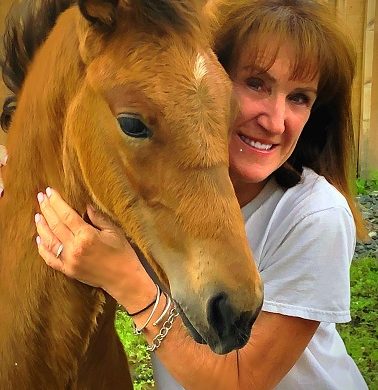By Page H. Gifford
Correspondent
Those who have owned, ridden and loved horses may not be aware of what happens to these beautiful animals when they have outlived their usefulness.
Lori Brown, a former horse show mom who traveled the circuit with her three daughters, devotes her time and love to horses in a different way now that her daughters no longer show. Her mission nowadays is to use her horse farm as a halfway house for rescued horses, and a sanctuary for those put out to pasture until their last days.
Her farm sits on 245 acres in the Cunningham area of Fluvanna. Brown bought the farm in 1999 and initially owned hunters and jumpers, but in 2012 when her daughters went to college and moved away, she found a new purpose. Her farmis not a rescue but is rather a private farm that cares for retired and rescued horses for a nonprofit organization in New Jersey. She currently houses 96 horses, but her numbers can change as horses find their forever homes or pass away.
Since Brown had the facility and the experience, she was able to help when she was contacted by the Standardbred Retirement Foundation, looking to board horses in Virginia.
“Our weather is nice, not too hot and not too cold. It’s easier for horses to grow old without extreme temperatures so I agreed to take in a few of their retired horses and that’s how it began,” said Brown. All these horses have been Standardbred racers, meaning they pull sulkies or carts and are pacers or trotters as opposed to thoroughbred racing. Most have had second and third jobs in life, primarily as riding horses, and then they come to Brown to retire.
Brown began rescuing horses a year ago when another nonprofit organization, Save Our Standardbreds from Slaughter (SOSS), contacted her to take in a couple horses that had been saved from a kill buyer in Louisa. SOSS’s mission is to rescue these horses, rehab them and find forever homes.
“Unfortunately they are not always able to do that,” Brown said. “The kill buyers keep getting in horses, good people keep paying their bail money to save them, but without a home offer they have no place to go and the retirement foundation is forced to retire them in their program. At this time the foundation is full to capacity so unfortunately, unless a horse has a home offer, he cannot be saved.”
Most of the rescued horses Brown has at her farm come from auctions in New Holland, Penn. “Every one of my horses has a story,” she said. “There are stories of hard work, stories of abandonment, love stories, stories of life – just like people.”
She then told the story of Luna. “One horse was a little different than the usual horse coming from New Holland, and seemed to have been cared for by somebody before she ended up in the horse auction and then to me by way of the kill buyer.” The horse was pregnant and gave birth to a little filly born on the full moon before Easter. Brown named her Luna.
Grumpy Jake, his registered name, was nothing like his name but was instead what Brown calls an absolute sweetheart. Jake’s is a love story. Brown was contacted by a man from Ontario, Canada, desperately trying to find a place for his horse to stay until it was well enough to make the trip home. This man gave his horse away to a friend several years ago, who promised to keep him forever. That was not the case and the friend sold the horse. The original owner then found the horse in a sale in Canada but he needed $5,000 to buy the horse back and didn’t have the money. He lost the horse again. For the next five years he searched for this horse.
“He told me there wasn’t a day that went by that he didn’t think about him,” Brown said. “He contacted every rescue organization to please look for his horse, Grumpy Jake. Well, he [finally] got his phone call…that Jake had been found at a kill buyer in Virginia.” He paid for Jake immediately, but Jake was not healthy enough to travel to Canada. Brown was contacted and Jake is with her, rehabilitating. He will eventually be reunited with his owner, who was crying so hard on the phone at the good news that his wife had to take the call.
“My goal is to give each horse the best quality of life for its remaining years,” Brown said. “The key to that is not only medications and feedings, but grouping them with others by needs and personality. But we have to be their voice and tell their stories.”





